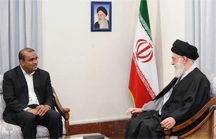President Bharrat Jagdeo has accused the US of acting in its own interest around the world and of blocking a visit of regional leaders to the quake-devastated Haiti.

“I was informed that a delegation comprised of Latin American leaders who were going to visit Haiti and contribute aid to that country faced the objection of the US government and could not make the humanitarian move,” Jagdeo was quoted as saying by the Iranian News Agency (IRNA).
A delegation of Caricom leaders, including Dominican Prime Minister Roosevelt Skerrit who is the chairman of Caricom, was turned back twice by US officials manning the airport in the earthquake-ravaged Haitian capital of Port au-Prince.
Jagdeo made the comments during the last day of his visit to Iran yesterday, while in a meeting with the country’s Vice-President Veep Rahimi.
Following the 7.0 earthquake that hit Haiti last week Tuesday, killing an estimated 200,000 persons and injuring over a million more, the Haitian government decided to hand over control of the airport to the US, a decision which was criticized by Rahimi yesterday who stated that the presence of US forces in Haiti was seriously affecting efforts by other countries to provide assistance to the country in its hour of need.
According to IRNA, President Jagdeo referring to Rahimi’s comments stated: “I am agreed with the entire axis of your comments.”
Last week Friday the US State Department confirmed signing two Memoranda of Understanding with the Government of Haiti that made “official that the United States is in charge of all inbound and outbound flights and aid offloading”.
According to the agreements signed, US medical personnel “now have the authority to operate on Haitian citizens and otherwise render medical assistance without having to wait for licences from Haiti’s government”.
Meanwhile, the news agency also quoted Jagdeo as saying: “Many of the moves of the Americans around the globe are against the norms and merely ensure their own interests.”
Jagdeo was reported as stating that Guyana has always pursued independent policies adding, “Although we live in the vicinity of the United States, we are not agreed with their entire stands, and we do express our dissatisfaction with lots of their policies and viewpoints now and then.”
IRNA also said that during his talks with the vice president Jagdeo referred to the contents of his meeting with Iran’s President Mahmoud Ahmadinejad, saying, “We were briefed on Iran’s capabilities in (the) agricultural and mining fields during the meeting and it was agreed that we would take advantage of both expertise.”
He expressed hope that a delegation from the Islamic Republic of Iran would visit Guyana to survey ways for cooperation.”
And the Guyanese leader made mention of the advancement of certain Asian countries, particularly China in the economic field, saying, “Today the Americans openly declare that they are concerned about some developing countries’ rapid advancement, such as China, towards becoming developed economic poles, since those countries can leave behind the United States economically in the future.”
He reiterated, “There are many countries and nations in the world today that do not seek salvation through attachment to the United States, having chosen other paths.”
The visit to Iran, which was the President’s final leg of his trip to the Middle East which also saw him visiting Kuwait and the United Arab Emirates (UAE), was aimed at generating interest in Guyana as an investment location and to strengthen ties with non-traditional trading partners.
The trip, which ended yesterday with a ceremony at Iran’s presidential palace, saw the signing of two Memoranda of Understanding (MOUs) by Foreign Affairs Minister Carolyn Rodrigues and her Iranian counterpart Manouchehr Mottaki. The MOUs deals with the facilitation of political and visa services and Iran’s development assistance to Guyana.
The Government Information Agency (GINA) had said on Wednesday that last year, Jagdeo had stressed that the global economic and financial crisis had made it difficult for Guyana to seek foreign direct investment (FDI) from the developed world and its traditional allies. As a result, he highlighted the need to develop new relations with other countries, including those in the Middle East. He had made two visits to the region last year, visiting Libya, Greece, Cyprus and Jordan.
